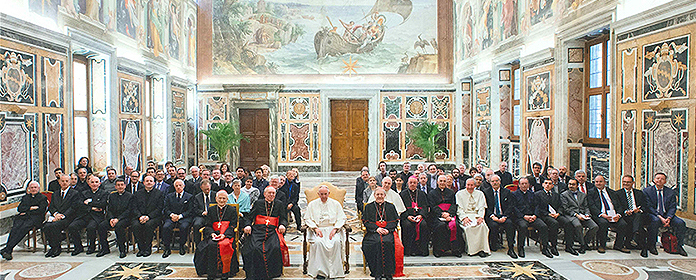Professors Saranyana and Labarga participate in congress in Rome on the occasion of the 500th anniversary of Luther's Reformation.
Pope Francis received at the Vatican the hundred or so experts in Church History who attended quotation at the meeting

The professors of the School of TheologyJosep-Ignasi Saranyana and Fermín Labarga participated from March 29th to 31st in a congress in Rome organized on the occasion of the 500th anniversary of Martin Luther's Reformation. Under the title degree scroll Luther 500 anni dopo. Una rilettura della Riforma lutherana nel suo contesto storico ed ecclesialequotation was attended by a hundred experts from different countries in America and Europe to analyze the figure, context and writings of the well-known German theologian.
The meeting, organized by the Pontifical committee for Historical Sciences, was attended by cardinals, bishops, professors from Roman universities and ambassadors, as well as theology professors and Protestant pastors from different countries, such as Norway and Germany.
During the meeting, the participants also had the opportunity to have a meeting meeting with Pope Francis at conference room Clementina in the Vatican.
The reception of Luther in Spain'.
The reception of Luther in Spain' was the focus of Professor Fermín Labarga's discussion paper , who said that the symposium "has been a great opportunity for meeting among historians working on the rich and complex figure of Luther, whose influence is extremely important for the development not only religious, but social and cultural of modern Europe".
The discussion paper of Professor Labarga has developed the reception that the figure and the work of Luther has had in Spain: "After some initial and confusing moments in which it was not clear what repercussions his proposals could have, after being excommunicated in 1521 Luther became an enemy of the Church, and particularly of Spain where he was considered the 'heresiarch' par excellence. The Inquisition tried to prevent his writings from entering the Peninsula, but the truth is that the limited success of his proposals had much more to do with a question of ideological order, such as the religious unity on which the national unity had been forged. With the passage of time, Lutheranism could not take root in Spain either and, test of the scarce interest that it has aroused, is that until the 20th century his writings have not been translated into Spanish, and this only fragmentarily. It can be concluded that the figure of Luther in Spanish historiography constitutes a lacuna, which has only recently been remedied when publications have begun to appear that attempt to approach him in a considered manner".
'Approaching Luther: theological and ecclesial context'.
Professor Josep Ignasi-Saranyana affirms that the meeting has had a "considerable" technical level: "Catholic and Lutheran specialists from Norway, Germany, Belgium, France, Italy, Spain, the United States and Mexico have participated. It was the first time that the Vatican has organized an event of these characteristics, to remember the German Reformer".
After the "question of eternal salvation", which had tormented Luther since 1505, Prof. Saranyana presented his "question of eternal salvation" in three parts. Saranyana presented his discussion paper, structured in three thesis : the first, on the distinction between the Catholic Reformation and the Protestant Reformation (the former accepts the beneficial influence of history on ecclesial life, while the latter condemns all change and seeks to return to an unchanged origin); the second, on the slow maturation, between 1513 and 1522, of the "Lutheran novelty", that is, of the Lutheran doctrine of justification understood as non-imputation; and the third, on the importance of the "matter of conscience", which led to Lutheran self-examination and self-judgment.
